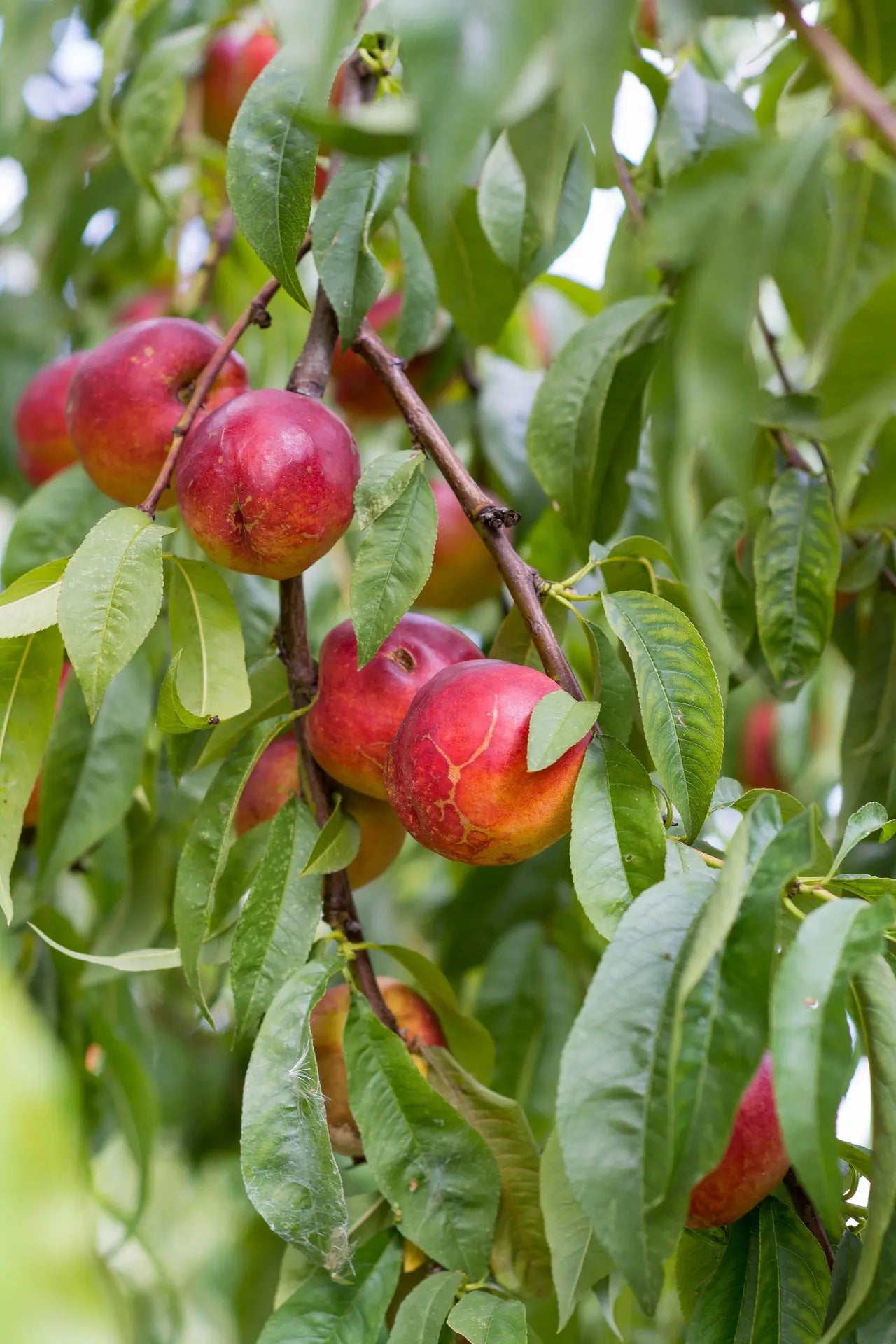-
Delivery from 10 plants to France, Switzerland and Europe
Delivery method -
Fruit Tree Wholesale Supplier
About Us -
Quality Fruit Tree Plants
Technical itinerary
Honey Late® Yellow Flesh Nectarine Tree grafted on RP-40 1L pot
Honey Late® Yellow Flesh Nectarine Tree grafted on RP-40 1L pot
The prices shown are our base prices for large volumes. Depending on the quantity ordered and the producers’ pricing scales, the rate may be adjusted upward. Each quote is personalized to ensure you receive a fair price.
Mini order 50 units / Multiple orders 10 units (FRSHER202503001)
Couldn't load pickup availability
 Buy now and get it delivered when you're ready to plant - Add your desired date to your quote request
Buy now and get it delivered when you're ready to plant - Add your desired date to your quote request
- Delivery from 10 plants to France, Switzerland and Europe

Honey Late® Yellow Flesh Nectarine Variety Data Sheet
- Fruit flesh color: Yellow
- Skin color: Dark, shiny red over the entire surface of the fruit
- Size and shape: Dominant size AA. Oblong or oblate shape (slightly flattened).
- Tree size: Vigorous tree with a semi-erect habit.
- Fruit Maturity: Late, ripening in late August to early September, about 3-4 days after the control variety Zee Glo.
- Fruit taste: Very good taste quality, sweet and aromatic, with a low acidity level.
- Earliness of the variety: Late
- Fruiting period Late August to early September
- Disease resistance and storage: Fruits hold up well after harvest. Valued for their resistance to rain cracking and good firmness.
- Variety yield: High and consistent productivity, with a yield potential of around 40-45 tonnes/hectare.
- Commercial use: Interesting variety for professionals thanks to its productivity, the quality of its fruits and its good post-harvest shelf life.
- Is this a PVP variety? Yes, Honey Late® is a variety protected by a Plant Variety Certificate (PVC). The breeder is Zaiger Genetics and the publisher for Europe is International Plant Selection (IPS).
- Comments: Late variety bred in the United States by Zaiger Genetics. It is known for its high productivity and the taste quality of its fruits.
Quick read / the essentials on Nectarinier Honey Late®
Among the most promising late varieties on the market, Honey Late® stands out for its exceptional taste quality, very good firmness and premium visual presentation. This yellow-fleshed nectarine , selected by Zaiger Genetics and distributed in Europe by IPS, is part of the HONEY ZEE® series, renowned for its high-value fruit. Its AA size , garnet-red skin covering up to 100% of the fruit and high Brix level (up to 16) make it a benchmark at the end of the season.
As a specialist wholesale supplier of nectarine plants , Arboriverse recommends this variety to professional growers looking to position themselves in high-end markets from late August to early September. The tree, vigorous and late flowering, adapts to French conditions while limiting the risks associated with spring frosts.
Buying Honey Late® nectarine plants means securing a late harvest with large, sweet, firm fruit that is transportable and valuable in long supply chains as well as direct sales. Its excellent post-harvest preservation and resistance to cracking in the rain make it a decisive commercial asset.
As a specialist wholesale supplier of nectarine plants , Arboriverse offers you certified plants, ready to integrate into a high-performance and sustainable growing process. Buying Honey Late® nectarine plants means investing in a reliable solution to extend the sales season with attractive, sweet and profitable fruit.
Origin and varietal status
Honey Late® is a yellow-fleshed nectarine variety bred by Zaiger Genetics in California, USA . It is part of the HONEY ZEE® series, renowned for its sweet, firm-fleshed fruit. This variety is protected by a Plant Variety Certificate (PVC) and is produced in Europe by International Plant Selection (IPS) . Commercial use requires compliance with associated rights.
Fruit characteristics
Honey Late® fruits are large in size , mainly AA grade, with an average diameter of 67 to 73 mm , which gives them a high potential for fresh production. The shape is spherical , sometimes slightly elongated, and the stone is free , facilitating preparation for consumption.
The flesh is yellow in color, firm, soft, very sweet (high Brix degree up to 16) and aromatic , offering a superior taste quality , particularly sought after at the end of the season. The fruit is also distinguished by its dark garnet red skin , covering 90 to 100% of the epidermis, shiny and attractive, providing an excellent visual presentation .
The fruits have very good firmness and slow post-harvest development , which ensures good conservation , as well as resistance to transport and handling . A natural resistance to cracking in the rain is also observed.
Tree characteristics
The Honey Late® nectarine tree is vigorous to very vigorous, with a semi-erect habit , making it easy to maintain the orchard. Mature height is generally between 3 and 4 meters , for a similar spread.
Flowering is medium to late , abundant, which limits the risks linked to spring frosts and promotes good fruit set in the majority of French production areas.
Staking is recommended during the first years of planting to ensure good tree formation, particularly given its vigor and potential fruit load.
Maturity period
Honey Late® is a late variety, with a harvest between late August and early September , approximately 8 days after Red Fair® and 12 days after Honey Cascade® . It therefore allows for an extended marketing period for nectarines beyond standard varieties.
Fertility and reproductive behavior
Honey Late® is a self-fertile variety, which makes it easier to manage in a single-variety orchard. However, the presence of compatible varieties nearby can encourage cross-pollination and improve yields under certain conditions.
Resistance and sensitivity
No specific data has been collected on disease resistance . Like all nectarines, Honey Late® can be susceptible to peach leaf curl , powdery mildew or brown rot . Preventive treatments , particularly with Bordeaux mixture at the end of winter, are recommended.
Similarly, no information was found on pest resistance , but as with all varieties, regular monitoring against aphids and other pests is essential.
Tolerance to drought , lime , or root asphyxiation is not specified. These factors will depend largely on the rootstock selected.
Compatible rootstocks recommended in France
To optimize the development and resilience of Honey Late® depending on the nature of the soil, the following rootstocks are recommended :
-
GF 677 : vigorous, suitable for dry and calcareous soils.
-
Rubira : medium vigor, well adapted to dry soils.
-
Saint Julien GF655/2 : moderate vigor, excellent in heavy or wet soils.
The choice of rootstock must be adapted to local soil and climate conditions and to the planting density objective.
Performance and economic potential
Honey Late® is a very productive variety , with an estimated yield of up to 40 tonnes/hectare under optimal conditions. On average, a mature tree can produce 20 to 40 kg of fruit per year depending on growing conditions.
It is mainly intended for fresh consumption , with potential for export or distribution in supermarkets thanks to its good post-harvest shelf life and attractive presentation . Processing (juice, compotes, jams) is possible, but the best economic potential is in direct sales or long circuits at the end of the season , a period when the competing offer is weaker.
Strategic advantages for producers
-
Extension of the harvest season : allows you to capture late summer markets.
-
Good commercial margin potential thanks to visual and taste quality.
-
Suitable for fresh sales but also for long-distance transport.
-
Late flowering reducing climate risk in spring.
Conclusion
Honey Late® is a high-quality late nectarine , suitable for demanding professional production. It combines excellent presentation , a sweet and aromatic flavor , large size and good post-harvest stability , making it a strategic choice for extending the nectarine campaign in France.
To summarize: Nectarine Honey Late®
The Honey Late® variety is positioned as a strategic solution for producers wishing to extend their harvest calendar beyond traditional varieties. Thanks to its late maturity , AA size , firm and very sweet flesh , it meets the growing demands of the fresh market at the end of summer. Its shiny red skin , free stone and excellent post-harvest stability make it a premium fruit with high added value.
Arboriverse , a specialist wholesale supplier of nectarine plants , supports you in setting up high-performance orchards, adapted to the demands of long supply chains, large-scale distribution or high-quality local markets. The choice of rootstock (GF 677, Rubira, Saint Julien, etc.) allows the variety to be adapted to a wide variety of soils and cultivation systems.
Buying Honey Late® nectarine plants means opting for high productivity (up to 40 t/ha), optimized profitability at the end of the season and marketing facilitated by flexible and efficient logistics. The tree, with its semi-erect, vigorous growth and medium to late flowering, is particularly well suited to areas at risk of spring frost.
As a specialist wholesale supplier of nectarine plants , Arboriverse selects technical and commercial varieties with high potential. Buying Honey Late® nectarine plants means capitalizing on a strategic window, with fruit that is as beautiful as it is delicious, perfectly suited to the demands of consumers and professional buyers.
-
Honey Late® Yellow Flesh Nectarine Tree grafted on Garnem bare-root 100-120 cm
Regular price €5,95 EURRegular priceUnit price / per -
Honey Late® Yellow Flesh Nectarine Tree grafted on RP-40 bare-root 100-120 cm
Regular price €6,55 EURRegular priceUnit price / per -
Honey Late® Yellow Flesh Nectarine Tree grafted on PR-R/Mirared bare-root 100-120 cm
Regular price €6,15 EURRegular priceUnit price / per -
Honey Late® Yellow Flesh Nectarine Tree grafted on GF677 and Mirab.29-C bare-root 100-120 cm
Regular price €5,75 EURRegular priceUnit price / per -
Honey Late® Yellow Flesh Nectarine Tree grafted on Garnem 1L pot
Regular price €6,25 EURRegular priceUnit price / per -
Honey Late® Yellow Flesh Nectarine Tree grafted on RP-40 1L pot
Regular price €6,85 EURRegular priceUnit price / per



